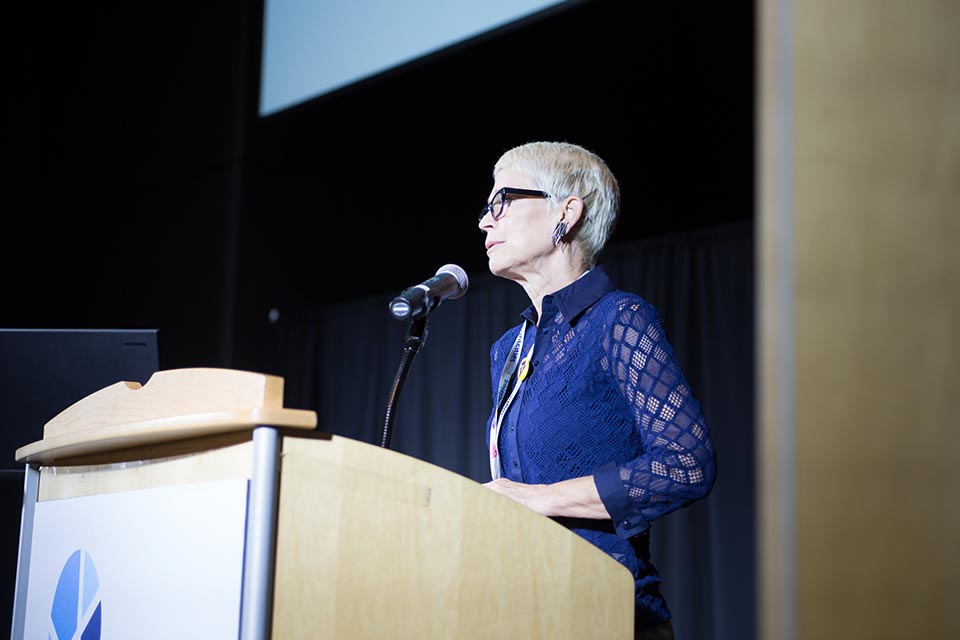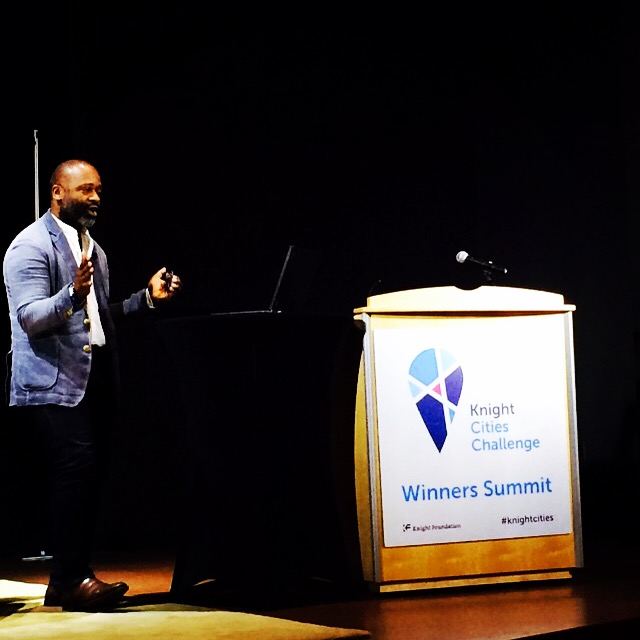
Bringing big ideas to life at the Knight Cities Challenge Summit
Photos: Carol Coletta, above; Theaster Gates, below.
The old, neo-Colonial bank is a husk of its former self, long empty but still grimly squatting along a city block on Chicago’s south side. It’s the kind of neighborhood artist/urban planner/University of Chicago professor Theaster Gates likes to work in. And it’s the kind of building he likes to snatch up and transform into something beautiful and useful to the surrounding neighborhood. Later this year, it will be the site of the Chicago Architectural Biennial and will likely become an exhibition space – or some variation of a place that sparks engagement and investment.
The thing is, Gates told a group of fellow civic innovators, he doesn’t quite know what the 24,000-square-foot behemoth will ultimately become. And that’s good.
“A little vagueness allows us to continue to scratch our heads,” he said, even if lenders are pushing him to define what exactly he plans to do with it.

Reinvention happens when the mind is open, said Gates, who is among the visionaries speaking this week at the Knight Cities Challenge Summit. The three-day gathering in Detroit brings together the 32 winners of Knight Foundation’s first-ever Knight Cities Challenge, which seeks ideas to make cities more successful. Their projects include redeveloping overgrown school yards into civic parks in Philadelphia, installing popup stores in a parking structure in San Jose, creating a hub for rehabbers in Detroit, and welcoming newcomers to St. Paul with winter hats. All of the ideas focus on three drivers of city success: attracting and keeping talented workers, expanding economic opportunity and breaking down barriers, and creating a culture of civic engagement.
The winners, who are splitting $5 million, are hearing from leading civic innovators like Gates and, in breakout sessions, exchanging ideas to help each other meet challenges and overcome barriers, whether physical, racial, political or economic. They are also seeing a bit of Detroit, a city filled with all of said barriers.
“We’re having it in Detroit because Detroit is in a moment in time where there’s so many interesting people working on so many different things to reinvent Detroit and to take advantage of a moment when anything is possible. We think it sets the right mood and stage for this summit,” said Carol Coletta, Knight’s vice president for Community and National Initiatives who moderated the keynote talks.
Indeed, things can happen when the mind is open and the raw materials are right there. The celebrated High Line in New York City, for example, is the brainchild of Robert Hammond, who worked with a travel writer friend to revive the 1.5-mile elevated rail line, which runs parallel to the Hudson River in Chelsea. The city planned to demolish it, but Hammond saw its potential to connect various neighborhoods on the city’s lower west side. Five years later, after lawsuits and zoning changes and community input sessions, the High Line was born.
Today, Hammond said, it is more popular among tourists than the Museum of Modern Art and other New York staples, with some six million visitors a year. The High Line features 450 free programs each year. It employs 120 people from the surrounding neighborhoods.
“It cost $190 million to build, but over a 20-year period, New York City will receive $1 billion in tax revenues,” Hammond said.
“I hope the High Line makes the crazy credible.”
Speaking on the theme of breaking rules Thursday were Fred Dust, a partner at the design firm IDEO, and Jake Barton, founder of Local Projects, a media design firm.
Barton said the future of cities is “phygital,” both physical and digital. Digital projects that engage people’s minds – pull them away from their personal screens – need to sit alongside ‘’bottom-up’’ projects like Detroit’s Mower Gang, a band of mowers who cut grass in abandoned parks and playgrounds, he said.
Dust, whose company helps cities engage with residents – he worked in Peru to help restore public trust in the police (by adding more women to the force) – gave this advice to grantees: Listen, look, empathize, and be brave.
Julie Edgar is a Detroit-based freelancer. Email her at [email protected].
Recent Content
-
Community Impactarticle ·
-
Community Impactarticle ·
-
Community Impactarticle ·


